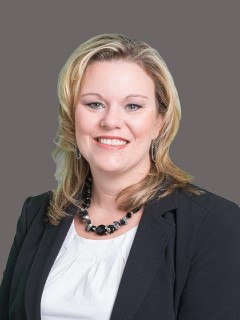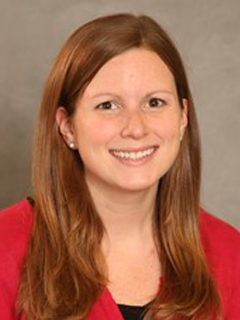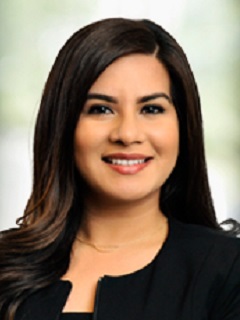KPMG Women in Finance
Building a consulting culture where women lead, and careers thrive

Overview
KPMG Women in Finance
Building a consulting culture where women lead, and careers thrive
KPMG is proud to recognize the contributions of the women in our Finance Transformation practice. They have strengthened our client relationships beyond measure, and our firm is made tangibly better by their presence—from highly visible leadership roles to core team contributors.
We spotlight three women from our practice here. They are a representative example of the caliber and talent of the 165 women of our Finance Transformation practice.
Find your voice and build your tribe

Julie Munn-Sims
Meet Julie Munn-Sims
Building a career and a family
Coming out of college, I had a hard time envisioning being confined to a desk throughout my career. I was intrigued by the idea of consulting because it provided a golden opportunity to gain exposure to multiple companies, industries, and business problems.
I started my consulting work and married just a few months later. I returned from my honeymoon on September 9th, 2001, flew out to Chicago for my project the next day, and then the 9/11 attacks happened. Though that was the front-end of my traveling as a consultant, travel was a constant in my life through the next fifteen-plus years and through the birth of my three children. Fast forward and my kids are now all in high school and I have been able to settle out of weekly travel requirements given my focus on the energy industry and living in the Houston area.
Flexibility: The key to work-life balance
There is no such thing as a daily work-life balance. I believe that balance is equal parts work and equal parts life but not necessarily always at the same time. Some days work is a priority, and some days life is a priority. The key to ensuring that both needs are ultimately balanced is found in your flexibility and how you manage your priorities. If a work project is up against a deadline, then that’s when I need to be flexible to answer the needs of the client and perhaps be on the road longer than planned. And when I need to be home to be at one of my kid’s games or meet the plumber, that becomes the priority.
Find your voice and build your tribe
There has been real progress to celebrate around women in the workplace. Though some gender inequality stubbornly remains, many barriers are the ones we put in place ourselves. My advice to young women just entering the workplace is to find your voice and build your tribe.
Silence and powerlessness go hand-in-hand. While your voice may not echo the popular opinion, if it reflects your experience, it’s of value and needs to be heard—to the benefit of all in the room. And the importance of building a community of people you trust, those you feel safe to express ideas and perceptions—and be validated or challenged—is invaluable. This is how we connect, support each other, and advance together.
Learn to say 'yes' to hard challenges

Christine Maynard
Meet Christine Maynard
Taking my parents’ advice
The year 2010 was a dark time for the banking industry and a challenging time to be a graduating Finance major. The recent financial crisis had caused hundreds of banks to fail and with that went many of the financial jobs that recent graduates used to be able to count on.
When KPMG opened job postings for Associate, Finance Transformation roles, I applied despite not fully understanding what I’d be doing. While considering the offer I received, I looked for advice from who else, but my parents. Despite my hesitation to become a consultant, they suggested that it would be a good move for a couple of years, and at the very least, I would build a resume and have the opportunity to work with a lot of intelligent people. Twelve years later, I count listening to my parents as my smartest career move.
Representation matters
The Financial Services sector is male-dominated, as is the consulting industry. When your top clients are men, and the vast majority of your colleagues are men, it can sometimes feel intimidating being the only female at the table. It can amplify concerns that I might say the wrong thing and make me second guess myself. I’m managing those tendencies by strengthening my leadership voice, developing a support network of other women, and actively helping the women behind me get comfortable in their respective roles.
I’m grateful that KPMG genuinely invests in female professional development through both formal and informal mentorships and leadership programs. I’ve had countless people, both men and women, generously give me their time and attention to help me polish my skills and improve my performance.
Going outside comfort zones
I’m not one to ask to be put in a stretch professional situation. Fortunately, others have seen my potential and have encouraged me to take on challenging projects as a developmental opportunity. It’s a way of saying, “I believe in you,” and that’s made all the difference in my career. I’m passionate about doing the same—pushing others beyond their comfort zone to try something new—secure in the knowledge that I have their back.
Although much time has passed, I’m still acutely aware of the discomfort I felt in my earliest consulting days, where during my first week, I repeatedly heard reference to a “general ledger.” I had no idea what that meant, yet I was afraid to ask because it seemed like everyone else was clear on the term. I now take it as my solemn responsibility to ensure people feel comfortable coming to me with those questions!
Bring people along on your journey

Andrea A Alejandre
Meet Andrea A Alejandre
Youthful goal: A businesswoman who traveled
Growing up in a family of pilots, I was fascinated with aviation and travel from a young age and have many fond memories playing in my family’s hangers and of sunset rides with my grandmother. As a young girl, having witnessed the women I admired regularly travel for work, I was inspired to become “a businesswoman who traveled.” I had no idea what that might encompass, but I found the idea exciting, and joining KPMG upon college graduation, paved a path to make that dream a reality.
My first six years at the firm, prior to Covid-19 restrictions, were nonstop travel. I traveled domestically, from coast to coast, and internationally, doing sustained client work in places as far-flung as India, Singapore, England, Poland, and the Netherlands. Being bilingual helped me in several international assignments.
Diverse backgrounds, diverse perspectives
One of the things that has surprised me most in my work is to see the very different paths people have taken to land on the Finance Transformation team. Some bring strong technical skills to the team, such as our engineers and CPAs, while others—English majors, for example, bring different skill sets. That diversity in background and thought offers fresh perspectives to our clients.
We work on complex implementations, providing solutions that will be used by people who may not have a technical background, so it’s our job to make those solutions operational for everyone.
Bringing people along on the journey
I lead our Finance Transformation Service Network Training. Its primary purpose is to better equip our professionals with the tools to be successful in the early stages of their KPMG career, with an emphasis on core finance delivery skills that our professionals can translate directly into their roles on any engagement.
Reflecting on my own experience, I was somewhat on my own trying to figure things out when I started at KPMG. Having the opportunity to take on this new challenge to continue to develop a program that so many have contributed to is something I’m very passionate about. A more formalized training brings everyone to the same starting point, allowing everyone the same opportunity to succeed. I have a great team who is equally passionate about our vision, and I believe it’s important to bring people along on the journey with you—you teach them, and they teach you.
As a first-generation college graduate, I have been a role model for my younger siblings, and that makes me incredibly proud to share my accomplishments and see them go on to do great things, as well.
KPMG International Women’s Day Signature Event
Please join our fifth annual International Women’s Day Signature Event: March 8th, from 12-1:15 pm ET.
Explore more

Future of finance
The CFO agenda for elevating finance

Evolving GBS: Integrating Finance as a Service for Higher Value
AI-enabled finance delivery elevates GBS from transactional to strategic

